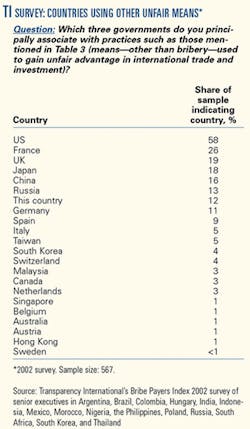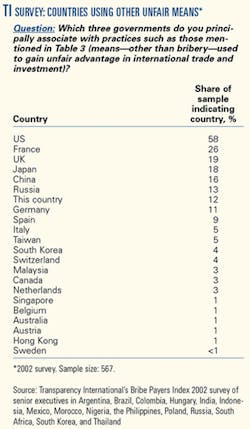Special Report: The US anticorruption record in principle and practice
The US can claim credit for taking a strong legal and moral lead against transnational bribery by passing the Foreign Corrupt Practices Act (FCPA) in 1977 and, more recently, by pressing for the full implementation of the Organization for Economic Cooperation and Development convention on bribery. The US government has set an example by prosecuting US companies even when this conflicts with the country's commercial interests.
American companies have paid a high price in lost business. The US Trade Compliance Center's latest report on the OECD convention estimates that the competition for 60 contracts worth $35 billion may have been affected by bribery of foreign officials between May 1, 2001, and Apr. 30, 2002.1 US firms are believed to have lost nine of these contracts, worth $6 billion.
Bribery allegations were connected to contracts in several sectors, including energy, telecommunications, and construction. The center does not give details of the allegations, which were based on confidential intelligence sources, but the overall pattern is plausible.
However, the disadvantages faced by American companies should not be overstated. In many respects, the FCPA has strengthened their position by giving them a legal basis on which to resist demands for bribes: A contract won through honest competition is more likely to survive changes of government than one founded on corruption.
Moreover, the major US companies are better placed to resist demands because of their size and technological expertise and because they typically enjoy strong support from the US government.
The nature of US government support may itself be controversial. In Transparency International's 2002 Bribe Payers Index (BPI), respondents in 15 emerging markets were asked about "other means of gaining unfair advantage," apart from bribery. These included diplomatic or political pressure, financial pressure, and tied foreign aid.
Some 58% of the sample associated the US with such practices, followed by 26% for France, and 19% for the UK (see table). Diplomatic pressure can be a legitimate counter to illegitimate business practices, but this depends on the form it takes.
The BPI survey also asked which country's companies were most likely to pay bribes. Australia emerged as the country least likely to pay, followed by Sweden and Switzerland. The US was ranked 13th, on a par with Japan and below Germany and France. This relatively low rating does not mean that 25 years of implementing the FCPA have been in vain; it does underline the challenge that all countries face in putting principles into practice in a fiercely competitive commercial environment.
Anticorruption laws are only the beginning.
Reference
- Trade Compliance Center, OECD Anti-bribery Report 2002, Chapter 9. Available on www.tcc.mac.doc.gov.

